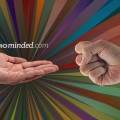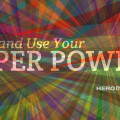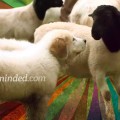Through the ages, we developed physically and socially with a villain and a hero within ourselves. How did this happen?
The villain looks out for himself. That’s what he had to do to survive. When there was a fight for resources – imagine the only drumstick with too many hungry mouths around the campfire — the winner was the one willing to fight the hardest and do whatever was necessary to win. The strongest survived, but it was also the most selfish and ruthless. Those were the genes that went on to reproduce, and those were the social skills observed as successful and passed along.
Power ruled.
And then something amazing happened. Two joined together and found that through cooperation, they could fight off one. By working together, by overcoming the need to fight each other and building trust, they were able to do more. Hunt better. Gather further. Pool resources. Create a larger group for better survival. And the next generation inherited and learned from them.
As time went on, the size of the cooperating groups grew. First it was those that would look after their offspring that had a better chance at passing along their genes and behavioral influences. Those who wouldn’t put their offspring above their own needs would die out. Then it was those that would look out for their tribe that survived better. Then a village, city, region, nation. The larger the group who cooperated, the more resources were pooled, including resourcefulness and knowledge. Ingenuity and trustworthiness were rewarded. Greater threats were fought off. As societies grew, it became crucial that we maintained behavior in which we considered the needs of others. We developed internal impulses and societal structures that encouraged cooperation – at least at a group level.
And deep down inside, we started valuing the hero. The one that would put the needs of others ahead of his own.
Collaboration ruled.
When we observe what’s going on around us, we realize there are still a lot of people in this world fighting for their own individual survival. They’re concerned solely for themselves – or perhaps they’re developed to the point where they value the small group of humans immediately surrounding them – often family. Their choices are more likely to be for their own benefit – or worse – they will meet their own needs to the detriment of others. They are driven by primitive ego and fear – born of those early survival instincts.
This is the villain mindset – and it is holding all of us back from bigger things that are possible with greater levels of cooperation.
It’s Survive vs. Thrive.
These tendencies war within us – the villain and the hero. One is only concerned with the need to survive in a world where others are fighting for their own survival, governed by fear and thoughts of scarcity. The other focuses on the need to collaborate because we all survive better when we do, driven by empathy and a desire to cooperate.
The more we magnify our hero, the more we can do together. And that is what we’re going to explore here.
“The only thing that will redeem mankind is cooperation.”
– Bertrand Russell






